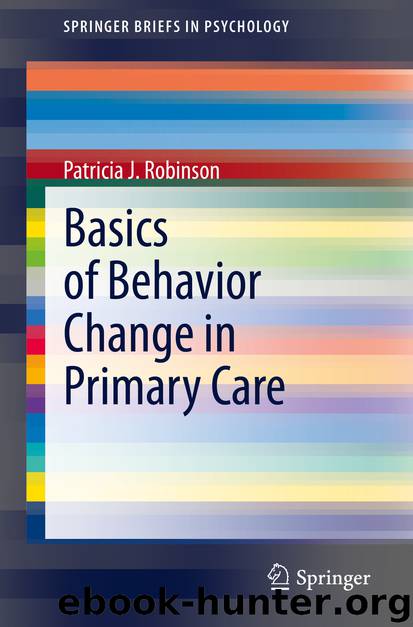Basics of Behavior Change in Primary Care by Patricia J. Robinson

Author:Patricia J. Robinson
Language: eng
Format: epub
ISBN: 9783030320508
Publisher: Springer International Publishing
Contextual Interview Questions
Use of questions suggested in Table 4.1 (Contextual Interview Questions), encourages development of a strong relationship with the patient during the course of assessment, because of their focus on the patient’s experience and understanding. Patients like to be seen as experts on themselves and they tend to trust a plan that results from a clinician taking the time to understand the patient’s point of view. The goals of contextual interviewing are to obtain information about the patient’s life context and to complete a functional evaluation of the problem. Sometimes, the clinician does not need to assess the life context because they already know the patient well.
At other times, the clinician may have a busy schedule and lack the time needed to complete both sections (i.e., life and problem). When time is limited, even if the patient is new to the clinician, it may be best for the clinician to focus on problem context questions and complete the life context questions in a future visit. While this may result in a less precise behavioral experiment, it is best to help the patient develop a plan than to suggest that they return on a different day.
The Contextual Interview Questions (Table 4.1) help clinicians to be time-effective in completing functional assessments. The wording of questions can be changed to accommodate cultural and other factors, such as the patient’s developmental context. For example, rather than asking questions about work, a clinician would ask an 8-year-old questions about school, such as, “What grade are you in? Do you like your teachers?”
Not all questions are necessary in all interviews; the list is suggestive. That being said, it is a well-thought-out list and one that clinicians are wise to use while learning the skills of functional assessment. The yes / no format helps clinicians quickly obtain information for a broad understanding of the patient’s current life circumstances.
Participating in the contextual interview is a cognitively demanding task for patients and patient behavior in this demand situation provides information about the patient’s psychological flexibility. To what extent is the patient able to maintain their attention on the questions? Does the patient engage in questions related to their values or answer in a superficial way? What are the patient’s non-verbal behaviors communicating? Does the patient look away or fidget with their phone? Does a patient tell long stories?
Using a standard list of questions as a reference helps clinicians to ask the questions while simultaneously considering clues as the patient’s overall psychological flexibility. During the course of the contextual interview, a clinician listens to the patient’s answers and observes the patient’s behavior to better understand the patient’s level of psychological flexibility. As you will recall, Focused Acceptance and Commitment Therapy (FACT) and the pillars of psychological flexibility (i.e., open, aware, engaged) were introduced in Chap. 3 (for more information, see Robinson, Gould & Strosahl, 2010; Strosahl, Robinson & Gustavsson, 2012). This chapter provides a tool for gauging a patient’s psychological flexibility and identifying ways to promote more flexible responding (see Table 4.
Download
This site does not store any files on its server. We only index and link to content provided by other sites. Please contact the content providers to delete copyright contents if any and email us, we'll remove relevant links or contents immediately.
Rewire Your Anxious Brain by Catherine M. Pittman(18640)
Talking to Strangers by Malcolm Gladwell(13344)
The Art of Thinking Clearly by Rolf Dobelli(10446)
Mindhunter: Inside the FBI's Elite Serial Crime Unit by John E. Douglas & Mark Olshaker(9313)
Becoming Supernatural by Dr. Joe Dispenza(8198)
Change Your Questions, Change Your Life by Marilee Adams(7756)
Nudge - Improving Decisions about Health, Wealth, and Happiness by Thaler Sunstein(7689)
The Road Less Traveled by M. Scott Peck(7592)
The Lost Art of Listening by Michael P. Nichols(7487)
Mastermind: How to Think Like Sherlock Holmes by Maria Konnikova(7315)
Enlightenment Now: The Case for Reason, Science, Humanism, and Progress by Steven Pinker(7305)
Win Bigly by Scott Adams(7183)
The Way of Zen by Alan W. Watts(6596)
Daring Greatly by Brene Brown(6501)
Big Magic: Creative Living Beyond Fear by Elizabeth Gilbert(5753)
Grit by Angela Duckworth(5601)
Ego Is the Enemy by Ryan Holiday(5412)
Men In Love by Nancy Friday(5232)
The Laws of Human Nature by Robert Greene(5170)
